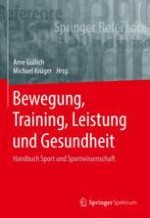2023 | OriginalPaper | Buchkapitel
Technologische Innovation in der Trainingswissenschaft: Digitalgestützte Trainingssteuerung mittels tragbarer Sensorik
verfasst von : Peter Düking, Michael Fröhlich, Billy Sperlich
Erschienen in: Bewegung, Training, Leistung und Gesundheit
Verlag: Springer Berlin Heidelberg
Aktivieren Sie unsere intelligente Suche, um passende Fachinhalte oder Patente zu finden.
Wählen Sie Textabschnitte aus um mit Künstlicher Intelligenz passenden Patente zu finden. powered by
Markieren Sie Textabschnitte, um KI-gestützt weitere passende Inhalte zu finden. powered by
